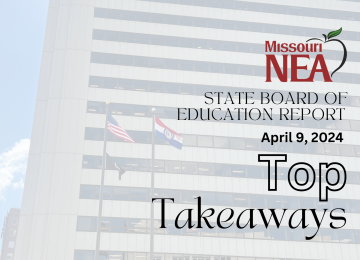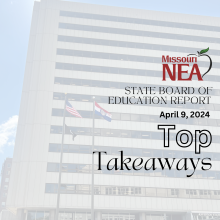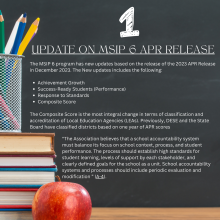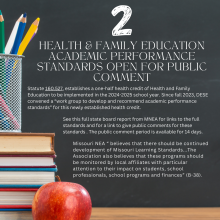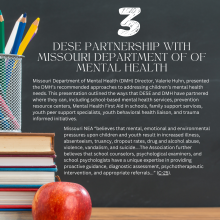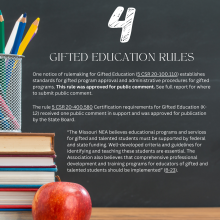The MSIP 6 program has new updates based on the release of the 2023 APR Release in December 2023. The new updates include the following:
- Achievement Growth: Replace continuous scoring and assigns points in four categories, similar to Achievement Status scoring.
- Success-Ready Students (Performance): adjustments to college and career ready assessment and advanced coursework data allowance and review and correction of data before June 30.
- Response to Standards: included in APR as planned and applies to all LEAs; total of 8 points possible.
- Composite Score: Averages three years of APR Data and classification recommendation requires two consecutive composite scores.
The Composite Score is the most integral change in terms of classification and accreditation of districts. Previously, DESE and the State Board have classified districts based on one year of APR scores. These new composite scores give districts all their detailed data needed to make decisions. The following is MNEA’s full resolution on school accountability and accountability systems.
“The Missouri NEA supports effective and fair school accountability systems. The Association believes that these systems must promote student excellence and growth that reflect meaningful, high-quality learning and ensure that the best teaching practices are supported and utilized.
The Association also believes that the focus of the accountability system must be on the school, not on individual stakeholders, as the unit for evaluation and improvement of student learning. Development and implementation of the accountability system must ensure that the stakeholders at the school, district, state, and national levels share the responsibility for establishing clear goals, adopting high expectations for student learning, demonstrating multiple methods of student success, and providing adequate and equitable funding 2 and support systems.
The Association further believes that a high-quality structure of accountability functions best when it is separate from high stakes testing and accreditation. A separate structure of accountability encourages schools to focus on improvement.
The Association also believes that a school accountability system must balance its focus on school context, process, and student performance. The process should establish high standards for student learning, levels of support by each stakeholder, and clearly defined goals for the school as a unit. School accountability systems and processes should include periodic evaluation and modification.” (A-4).
Statute 160.527 (HB 447 from 2023 Session), establishes a one-half health credit of Health and Family Education to be implemented in the 2024-2025 school year. In fall 2023, DESE convened a “work group to develop and recommend academic performance standards” for this newly established health credit.
The 29-person work group consisted of health professionals, mental health professionals, educators, former educators, DESE staff, and legislators. The work group considered related statutes (170.310, 170.015, 170.307, 167.182, 170.045) to ensure alignment with similar curriculums and standards already established in related areas.
The full standards can be viewed here and they are open for a 14-day comment period and review. According to the statute, they do not have to follow the traditional path that Missouri Learning Standards (RSMo 160.514) typically follow. All public comments for these standards can be submitted here.
Missouri NEA “believes that there should be continued development of Missouri Learning Standards. Clear performance standards also need to be developed for both core and non-core areas. The effectiveness of these programs depends on continuous development, implementation and evaluation…The Association also believes that these programs should be monitored by local affiliates with particular attention to their impact on students, school professionals, school programs and finances” (B-38).
Missouri Department of Mental Health (DMH) Director, Valerie Huhn, presented the DMH’s recommended approaches to addressing children’s mental health needs. This presentation also outlined the ways that DESE and DMH have partnered where they can, including school-based mental health services, prevention resource centers, Mental Health First Aid in schools, Family support services, youth peer support specialists, youth behavioral health liaison, and trauma informed initiatives. The guidance that the DMH follows derives from the U.S. Surgeon General with the U.S. Department of Health and Human Services. The three prime guidance documents used are linked here: Social Connection, Youth Mental Health , and Social Media and Youth Mental Health.
Missouri NEA “believes that mental, emotional and environmental pressures upon children and youth result in increased illness, absenteeism, truancy, dropout rates, drug and alcohol abuse, violence, vandalism, and suicide….The Association further believes that school counselors, psychological examiners, and school psychologists have a unique expertise in providing proactive guidance, diagnostic assessment, psychotherapeutic intervention, and appropriate referrals. These professionals should be utilized to the maximum benefit of all students. The roles of school counselors, psychological examiners, and school psychologists must emphasize the emotional well-being of students, assisting students to overcome obstacles to academic achievement and enabling students to maximize academic progress.” (C-25).
- Notice of Rulemaking & Order of Rulemaking for Gifted Education
One notice of rulemaking for Gifted Education (5 CSR 20-100.110) establishes standards for gifted program approval and administrative procedures for gifted programs. This rule was approved for public comment. Comments for this rule can be made “in support of or in opposition to this proposed amendment with the Department of Elementary and Secondary Education, ATTN: Christine Nobbe, Office of Quality Schools, PO Box 480, Jefferson City, MO 65102-0480 or by email to GiftedEducation@dese.mo.gov.”
The rule 5 CSR 20-400.580 Certification requirements for Gifted Education (K-12) received one public comment in support and was approved for publication by the State Board.
“The Missouri NEA believes educational programs and services for gifted and talented students must be supported by federal and state funding. Well-developed criteria and guidelines for identifying and teaching these students are essential. The Association also believes that comprehensive professional development and training programs for educators of gifted and talented students should be implemented” (B-23).
MNEA believes that every student and educator deserves the best experience possible in schools. That is why we are the only educational organization that is consistently present at every meeting of DESE, the state board of education, and the Missouri Legislature. We are your eyes and ears where decisions are being made about your schools when you cannot be.
The next meeting of the Missouri State Board of Education will be held on May 14, 2024 at DESE in Jefferson City, Missouri. If you have any questions or suggestions, please contact Samantha Hayes at 800-392-0236 or Samantha.Hayes@mnea.org.
Monthly State Board Report also available in Podcast form at MNEA Connects. Listen on Amazon Music, Apple Podcast, Google Podcast, Podbean, or Spotify.


